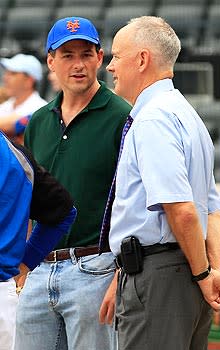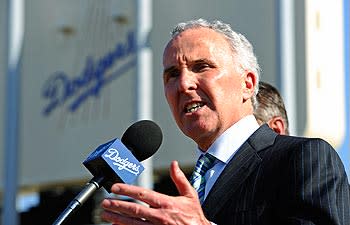Mets, Dodgers bonded by greed, futility
The New York Mets and Los Angeles Dodgers share far more in common than baseball commissioner Bud Selig cares to admit. Greed, excess, profiteering, power – the usual ills that come with entities worth billions of dollars and the people who live in the netherworld that rewards their pursuit.
Baseball's two problem children weaseled their way back to baseball's forefront Thursday, filling the void created by a September that looks as rousing as a Canasta tournament at the senior center. The instability of the Dodgers and the Mets is a long-running joke inside baseball circles. And this was too rich, too laughable even for the most avowed skeptic.
On the same day a hedge-fund owner stepped away from a $200 million investment into the Mets and left them in financial limbo once again, a businessman from Los Angeles offered $1.2 billion to buy the Dodgers – an unspecific amount of the 10 figures from "certain state-owned investment institutions of the People's Republic of China," according a letter obtained by the Los Angeles Times.
So the family that profited from Bernie Madoff's Ponzi scheme still owns the Mets, and China, tired of American debt's relegation from the International League to the Eastern League, is moving on to its sports franchises.
That sound you hear is baseball's palm smacking its forehead – again and again and again. It's one thing for the Texas Rangers, in flyover territory, to fall into bankruptcy and survive the process. It's another for MLB to watch two of its jewel franchises – one in each of its two biggest markets – let their dirty laundry flail about on a clothesline that stretches from coast to coast.
Certainly the Rangers' success last season dampened the focus on their financial problems. They flipped the narrative. No longer were they the team with the owner who spent himself into bankruptcy; they were the team that won in spite of the dolt. The Mets and Dodgers have found no such fortune. The Dodgers are 66-70, the Mets 66-69 – both at a clip in the .480s. They play the brand of baseball known as drying paint. Their mediocrity is usurped only by the chaos that surrounds it.
The issues mirror the teams' hometowns. Everything about the Dodgers is excessive: the emptiness of Dodger Stadium, the publicity of owner Frank and Jamie McCourt's divorce and the vacuousness of the bids coming in for the Dodgers.
This is not the first billion-dollar bid for the team, according to sources close to the situation. It is the latest, one source said, in a line of bids trying to capitalize on Frank McCourt's tenuous hold on the Dodgers. The details of lead investor Bill Burke's proposal, as outlined by the Times, proposes a deal that would be nearly impossible to consummate. Burke wants the purchase to close within 90 days, a near-impossibility, according to a major league source, because the vetting process for league ownership – especially that with vast amounts of money coming from a foreign company – would be expected to take far longer than three months.
While baseball is familiar with Asian businesses – Nintendo, of Japan, owns the Seattle Mariners – dalliances with China are far more complicated. McCourt tried to partner with Chinese investors two years ago, one of his attempts to capitalize a franchise that collapsed under the weight of his and his wife's spending. They bought a mansion – a figurative one, not among the seven they actually owned when married – and let it lapse into foreclosure. The Dodgers today resemble that sort of a mess, ransacked and unkempt and perfect for the sort of people who like distressed assets – the ones who see a billion-plus dollars in a franchise currently worth $800 million, according to Forbes, and probably less because it's bound to take years to properly rescue the team from its McCourt-induced dyspepsia.
The Mets' situation is as cold and cadaverous as the Dodgers' is slimy and greasy. Owner Fred Wilpon, who made his money in real estate and allegedly raked in millions through Madoff, finds himself in a severe money crunch because the trustee for Madoff victims is seeking $1 billion from him in restitution – money he doesn't have. Things were so dire, he sought an outside investor for a cash infusion. In came David Einhorn, the 42-year-old wunderkind stock-picker, whose hedge fund is worth $5 billion and who was happy to purchase 33 percent of the Mets for $200 million.
Einhorn also wanted to position himself to purchase a majority of the Mets down the road, and while he and Wilpon have done a friendly public tango for months, the deal was dubious from the jump. It collapsed Thursday, reportedly amid testy arguments over future control of the team. Wilpon, like McCourt, does not want to cede his franchise. His business is already under threat from one party; he wasn't going to let another sneak in and thieve it out from under him.
The Mets had already discussed the purchase of a portion of the team with investment banker Ray Bartoszek even though a deal with Einhorn was agreed upon. These were not good-faith discussions. The Wilpons used Einhorn to buy time to straighten out their finances and now want to sell 10 portions of the team to minority investors for $20 million a pop.
Give it up to Wilpon: Irving Picard, the trustee, is going to have to pry the Mets out of his cold, dead hands. The judge in the case expects to decide on whether to take the case to trial by month's end, and he already has set a trial date if he does so: March 5. MLB took control of McCourt's franchise when his attempts to sign an under-market media-rights contract threatened the values of the 29 other teams' deals, and McCourt, as he is wont to do, went litigious.
Which leaves two of baseball's jewels at the mercy of … the courts. It's a sad place for either to be; it's a harrowing one for both. Baseball's growth from a $1 billion industry to $7.5 billion in Selig's 20-year reign had its casualties, and the Dodgers and Mets are the biggest. McCourt bought the Dodgers with credit, and his downfall mirrors America's. Picard wants to prove Wilpon wasn't deceived by Madoff but was an active participant in his scheme. These aren't stories with which MLB wants to find itself intertwined.
And yet it's all part of the sausage-making process when a league's revenue grows so much and so fast. Cities get held hostage and pour tax money into privately owned stadiums. Ticket prices and concessions and parking skyrocket. Sometimes not even that is enough.
For the Mets and the Dodgers, baseball's kid gone bad and redheaded stepchild, that was the case. They might not be the same, but they're related, tied together by greed, excess, profit and power that dragged them into a netherworld from which they'll escape no time soon.
Other popular stories on Yahoo! Sports:
• Oscar De La Hoya bares his demons to the world
• Should BYU consider joining the Big 12?
• Arian Foster tweets MRI of hamstring injury
• Remembering Wade Belak, a true NHL fan favorite


